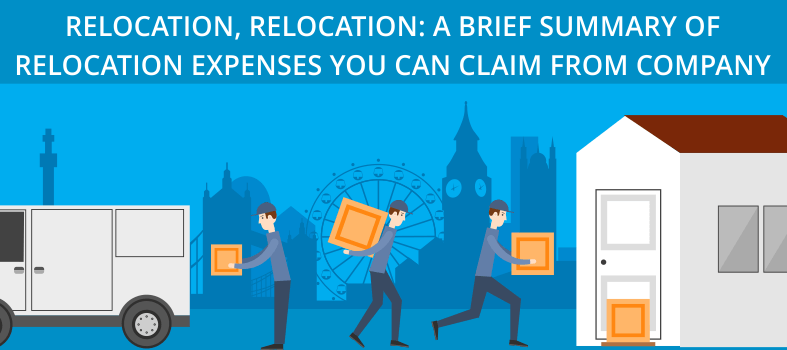A brief summary of relocation expenses you can claim from company
As a director/employee of your own company, if you move home/office due to relocation of your place of work there may be some exceptional and powerful allowances to claim from the company. This is called a relocation allowance.
Before I go further and you get over excited, let’s make it very clear that it’s not worth even considering claiming a relocation allowance unless you meet all four of the qualifying conditions. If you meet only three of the conditions and fail one, then you will not qualify.
Once you are satisfied that you meet all four qualifying conditions, then it is time to start working out the qualifying expenses and benefits you can claim. I will not go into extensive detail here, as the most critical part of the relocation allowance is to establish eligibility; from there, it is fairly straightforward for a member of the DNS team to work out which costs are eligible from the long list of qualifying expenses and benefits.

Let’s take a look at what the four conditions that you must meet in order to claim the relocation allowance.
REASON for relocation must be one of the following:
- A new job: you changed your job and place of employment. Your new place of employment must be significantly far away from your current residence to make relocation necessary.
- Change of duties: your duties have changed and you have been transferred to another department or branch as a result, which means you must travel a greater distance to your place of work.
- Change of location: the place where you carry out your duties has moved, which means that you must travel a greater distance to your place of work.
CATEGORIES of expenses and benefits must fall into one of the six below:
- Sale of former residence (= Benefit);
- Bridging loans: (= Benefit; please contact DNS if you need further information);
- Purchase of new residence: (= Expense);
- Removal costs of business/personal effects to new residence/premises: (= Expense);
- Associated travel and subsistence costs: (= Expense);
- Domestic goods for new residence: (= Expense).
TIME LIMIT to claim allowance
There is a time limit in which you can claim the allowance, and to qualify, the expenses must be incurred or the benefits must be provided before the end of the tax year immediately following that in which the employee’s circumstances changed due to work, outlined in the first step of this list.
Comment: If you changed your residence due to work commitments that meet the criteria given above in July 2012 (Tax Year 2012–13), you must claim all eligible expenses related to your relocation before 5 April 2014.
DISTANCE from place of work
The employee’s new residence must be a reasonable commutable distance from the new place of work; the former residence must not be within reasonable daily travelling distance of the new place of work.
Comment: Note that HMRC are keen to maintain that your old residence is not within reasonable commutable distance and similarly your new residence is within reasonable commutable distance to your place of work. What is a reasonable or unreasonable commutable distance? Clearly this is down to personal circumstances to some extent, but about 40 miles one way is considered a reasonable commutable distance.
There are some non-qualifying expenses and benefits, these include:
- Mortgage or housing subsidies incurred by moving to a higher-cost area;
- Mortgage interest payments for your existing home;
- Compensation for any financial loss on the sale of of your former home;
- Compensation for other losses, such as penalties for withdrawing a child from school without sufficient notice;
- Re-direction of mail;
- Council tax bills.
Let’s look at an example:
Ben relocates his business from London to Birmingham on 13 May 2012. He buys a new house in Birmingham on 28 July and moves that day, having stayed in a hotel between May and July 2012. His family joins him on 5 August and his house in London is sold on 23 August 2012. The expenses paid by his business and his liability to tax and NICs are shown in the table below. Remember however, that to be eligible Ben must claim these allowances and benefits before April 2014.
| Expenses and benefits qualifying for exemption | Amount subject to tax | Amount subject to NICs | |
|---|---|---|---|
| Travel and subsistence | |||
| Hotel accommodation May–July | 1,880 | ||
| Weekend travel, London to Birmingham | 980 | ||
| Family visits to look for new home | 800 | ||
| Costs of moving possessions | |||
| Removal van hire | 500 | ||
| Costs of disposing of home | |||
| Legal fees (sale) | 1,000 | ||
| Estate agents fee | 1,600 | ||
| Replacement domestic goods | |||
| Curtains, carpets, cooker | 1,800 | ||
| Costs of acquiring new home | |||
| Survey fee | 400 | ||
| Stamp duty | 900 | ||
| Legal fees (purchase) | 1,200 | ||
| Interest on bridging loan | |||
| Reimbursed by business | 600 | ||
| 11,600 | |||
| Less exemption (limited) | 8,000 | No limit | |
| 3,660 | NIL | ||
| Expenses and benefits not qualifying for exemption | |||
| Disturbance allowance | 2,000 | 2,000 | 2,000 |
| Payment for loss on part-used season ticket | 200 | 200 | 200 |
| Total expenses and benefits subject to tax and NICs | £5,860 | £2,200 |
Summary: relocation expenses you can claim The relocation allowance can be tricky because the maximum amount you can claim is £8,000, which must be claimed within the specified time limit. This allowance can certainly help reduce the burden on your pocket incurred by relocation, but claiming back expenses in this respect does demand some careful calculation as there is plenty of room for confusion and misunderstanding. May we suggest that you contact your account manager to discuss the details once you have considered whether you are eligible? As always, DNS Accountants in Harrow is always on hand to guide you on this or any other matter.
Also See: Complete guide on Directors Loans Accounts
Any questions? Schedule a call with one of our experts.








